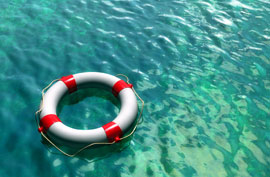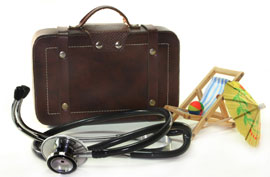 Purchasing travel insurance to protect yourself against unforeseen events such as natural disasters, missed flights and tour operators going bankrupt is often a wise choice. But which kind of travel insurance is right for you?
Purchasing travel insurance to protect yourself against unforeseen events such as natural disasters, missed flights and tour operators going bankrupt is often a wise choice. But which kind of travel insurance is right for you?
There are several different types of travel insurance policies available, ranging from trip cancellation insurance to emergency medical evacuation, all of which vary widely in what their coverage includes and how much it costs. Make sure you know exactly what your policy will and will not cover before you purchase anything, and always buy your insurance from a reputable company (check out our list of travel insurance providers at the end of this article).
If you're wondering whether you need to buy travel insurance for an upcoming trip, first look at the insurance policies you already have to see what they will cover. Some health insurance policies will cover medical emergencies overseas while others will not. Many homeowner's policies cover baggage loss. Also, many credit card companies (particularly gold cards) offer their members baggage loss, international medical assistance, and accidental death and dismemberment insurance if they simply charge their airline tickets on their credit card or for a small additional fee.
Since September 11, 2001, many are looking to travel insurance to safeguard their trip against any unforeseen terrorist attacks at their destination. Many policies now have an "Acts of Terrorism" clause that will reimburse you if you miss or are delayed in getting to your destination because of acts of terrorism. Check to make sure acts of terrorism are included before purchasing; some policies specifically exclude them.
When considering trip cancellation insurance, take time to think about how much money you'll be putting down before your trip. Are you purchasing expensive airline tickets that can't be refunded? Are you putting down a large nonrefundable deposit on a cruise or tour? If the answer is yes, or if you might cancel for any reason, then buying trip cancellation insurance is a prudent idea.
If you're an adventure traveler who has paid $3,000 up front for a white water rapids package deal in a remote area of South America and you won't receive any refund if you cancel, then you might want to consider both trip cancellation and emergency medical evacuation insurance.
 Travel Warnings and Advisories
Travel Warnings and Advisories
Following is a brief description of the different types of travel insurance options available. Note that every policy is a little bit different, so be sure to read the fine print carefully before purchasing any travel insurance.
Trip cancellation/interruption insurance covers you if unforeseen events cause you to cancel or interrupt your trip. In general, this coverage is meant for illness, injury or death suffered by the insured or a member of the insured's immediate family. Some policies also cover cancellation in the event of illness, injury or death to the insured's travel companion. Most policies exclude trip cancellation in the event of war, civil disturbance or a change in your own financial circumstances. (Lose your job before your trip? If you don't have job loss protection -- not offered by all companies -- you could be out of luck.) Some policies also exclude travel to specific destinations that are prone to political unrest.
Many comprehensive travel insurance policies now include coverage if your tour operator defaults; however, it is important to understand exactly what is covered by your policy. If you buy a policy directly from a tour provider, usually it does not cover the default of that provider -- so it's generally a good idea to purchase your policy from an independent company. Some policies only cover tour operator default if the operator ceases operations entirely, which they may not do even if they file for bankruptcy.
Some travel insurers also offer comprehensive "cancel for any reason" policies. You can find more information on several such policies at TripInsuranceStore.com.
 Medical insurance encompasses several types of coverage. Emergency medical evacuation insurance covers the cost of transportation if a qualified physician determines that you must be evacuated for treatment to the nearest medical facility or to your home country (if it's warranted), due to a physical injury or sickness. This insurance is highly recommended for cruise passengers and travelers visiting remote areas or developing countries.
Medical insurance encompasses several types of coverage. Emergency medical evacuation insurance covers the cost of transportation if a qualified physician determines that you must be evacuated for treatment to the nearest medical facility or to your home country (if it's warranted), due to a physical injury or sickness. This insurance is highly recommended for cruise passengers and travelers visiting remote areas or developing countries.
For example, if you fall and are injured while trekking in the Himalayas, you might need to be evacuated by private helicopter, then airplane -- which can get quite expensive. Emergency medical evacuation back to the United States without insurance can easily cost $35,000 or beyond. Check to make sure you choose an insurance provider that does not exclude adventure travel from its coverage.
Other types of medical insurance include:
A telephone number/service you can call that will direct you to English-speaking doctors while you are overseas. In some cases they will also provide a physician monitoring service, where a qualified physician from the U.S. will monitor the treatment you are receiving by a local physician via telephone.
Cash payment to the insured or beneficiary in the event of accidental death, loss of sight or loss of limb.
Reasonable expenses for repatriation of the insured's remains in the event of death.
Keep in mind that in nearly all cases you will need to pay up front for your medical services, and then your insurance company will reimburse you later, once you've made a claim.
 Money & Insurance Travel Resources
Money & Insurance Travel Resources
Before purchasing a travel insurance policy with medical coverage, be sure to check what your regular medical insurance does or doesn't cover, particularly when traveling overseas. You should also consider the medical care offered at your destination. Many Western countries have excellent socialized medical care available, and you may not even be charged for the care you receive. On the other hand, if you're in a remote area of a developing country and need to be evacuated for adequate medical care, the expenses can mount quickly.
Read the fine print regarding coverage or lack thereof for preexisting conditions. Generally any medical problem that arises within 60 days prior to purchasing the policy is not covered; however, there are some exceptions to this.
Baggage loss and delay coverage protects you in the event that your luggage is lost, delayed or stolen. This often includes a cash payment if your bags are delayed for more than 12 hours after you arrive at your destination.
Flight delay or cancellation insurance (sometimes called "travel delay") typically pays for accommodations, meals and new travel arrangements once you've been delayed a certain amount of time (often 6 or 12 hours -- read your policy carefully).
Travel document protection kicks in to help you replace a passport or other travel documents when they're lost or stolen.
If you travel many times a year (particularly internationally), it may be more economical to purchase annual insurance instead of individual policies for each trip. Annual insurance may also be a good idea if you regularly travel to developing countries, even if it's only a few times a year.
Most annual policies provide medical evacuation coverage, benefits in the event of loss of life or limb, as well as minimums for lost luggage and treatment costs for illness or injury. These policies typically do not include trip cancellation coverage, but in some cases you may add this for an additional fee.
 Here are a few established travel insurance companies to consider. Please read all terms and conditions carefully to be sure the policy provides the types of coverage you're looking for and is valid in the countries you'll be visiting.
Here are a few established travel insurance companies to consider. Please read all terms and conditions carefully to be sure the policy provides the types of coverage you're looking for and is valid in the countries you'll be visiting.